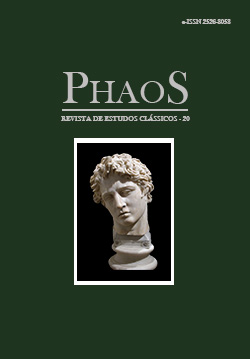Abstract
Discussed in Cicero’s De finibus V (Fin. V, 15-21), in the context of an exposition of Antiochus’ moral thought, the Carneadea diuisio may be understood as the theoretical core of the treatise. This paper presents a translation of the passage into Portuguese and intends, on the one hand, to analyze the argument attributed to Carneades, taking into account the context in wich it is presented and, on the other hand, to investigate how the division is related to the organization of the treatise and to the construction of Cicero’s academic stance.
References
ALGRA, K. Chrysippus, Carneades, Cicero: the ethical divisiones in Cicero’s Lucullus. In: INWOOD, B & MANSFELD, J. (eds.) Assent & Argument: Studies in Cicero’s Academic Books. Leiden: Brill, pp. 107-139, 1997.
AUVRAY-ASSAYAS, C. Réécrire Platon? Les enjeux du dialogue chez Cicéron. In: COSSUTTA, F & NARCY, M. (eds.) La forme dialogue chez Platon. Grenoble: Jérôme Millon, pp. 237-255, 2001.
BARNES, J. Antiochus of Ascalon. In: GRIFFIN, M. & BARNES, J. (eds.) Philosophia Togata: Essays on Philosophy and Roman Society. Oxford: Oxford University Press, pp. 51-96, 1989.
BOYANCÉ, P. Études sur l’humanisme cicéronien. A collection of 18 articles previously published in periodicals. Brussels: Universa, 1970.
CÍCERO. De diuinatione. With an English translation by W. A. Falconer. London: Harvard University Press (Loeb Classical Library), 1992.
CÍCERO. De finibus bonorum et malorum. Recognouit breuique adnotatione critica instruxit L. D. Reynolds. Oxford: Oxford University Press, 1998.
CÍCERO. De finibus bonorum et malorum libri quinque. With introduction and commentary by W.M.L. Hutchinson. London: Edward Arnold, 1909.
CÍCERO. De natura deorum / Academica. With an English translation by H. Rackham. London: Harvard University Press (Loeb Classical Library), 1979.
CÍCERO. Epistulae ad Atticum . Edited by D. R. Shackleton Bailey. Stuttgart: Teubner, 2v., 1987.
CÍCERO. Scripta quae manserunt omnia. fasc. 43. De finibus bonorum et malorum. T. Schiche. Leipzig: Teubner, 1915.
CÍCERO. Tusculanes. Texte établi par Georges Fohlen et traduit par Jules Humbert. Paris: Société d’Éditions “Les Belles Lettres”. 2 vol., 1931.
GLUCKER, J. Antiochus and the late Academy. Göttingen: Vandenhoeck und Ruprecht, 1978.
GLUCKER, J. Probabile, ueri simile, and related terms. In: Cicero the philosopher / Twelve papers. Edited and introduced by J. G. Powell. New York: Clarendon, pp. 115-143, 1995.
LÉVY, C. Cicero academicus: recherches sur les ‘Academiques’ et sur la philosophie cicéronienne. Roma: École Française de Rome, 1992.
QUINTILIANO. Institution oratoire. Texte établi et traduit par Jean Cousin. Paris: Société d’Édition “Les Belles Lettres”, 7 vol., 1975-1980.

This work is licensed under a Creative Commons Attribution-NonCommercial-ShareAlike 4.0 International License.
Copyright (c) 2020 PhaoS - Revista de Estudos Clássicos


